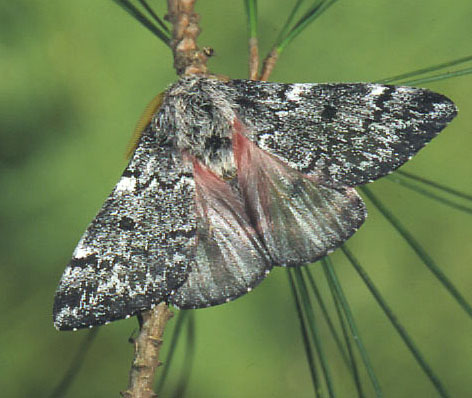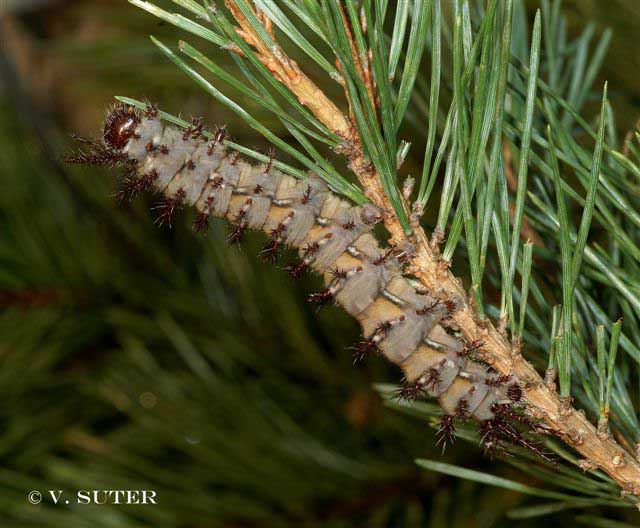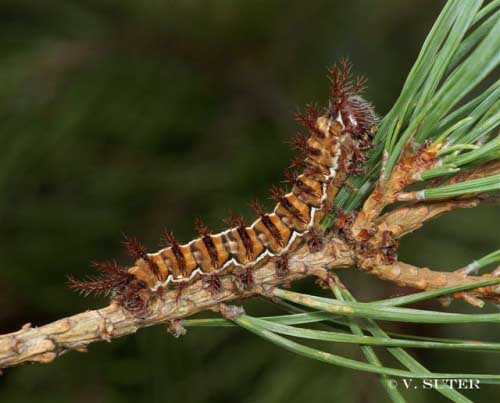COLORADIA OF THE WORLD

|
|
Updated as per Heppner's Checklist: Part 4B 1996, January 1, 2005 Updated as per Lemaire's Hemileucinae 2002, January 1, 2005 Updated as per Museum WITT Munchen internet publication, January 11, 2011 Updated as per Witt Museum Lists January 2012 Updated as per Global Mirror System of DNA Barcoding Analysis (locations and dates of BOLD submissions), January 2012 Updated as per Entomo Satsphingia, Jarhgang 3 Heft 5 18.11.2010; September 8, 2014 |


Coloradia velda larva copyright Kirby Wolfe
When adult moths are disturbed, they curl and pulsate the black and yellow ringed abdomen in a wasp-like fashion.
At rest, moths fold wings over their backs in a tent like fashion, tuck their antennae (males-quadripectinate, females-bipectinate) under the forewings, and seek out resting places where forewings tucked against bark offer them maximum camouflage protection.
Eggs, green at time of deposition, are deposited on pine bark or at base of needles. The micropyle turns black if eggs are fertile and eggs turn a bluish-grey colour with age. Young larve feed gregariously, often at the tip of a single pine needle.
Click on hypertext to access files. Range may exceed that listed.
Please note: The advent of DNA barcoding has resulted in many new descriptions. In many cases the "new" species are quite similar to existing species. Do not be surprised if even more refined testing or revisions of thresholds of difference in the future results in some synonymies or even more species/subspecies. Subsequent rearing may or may not indicate differences in larval appearance. It will be interesting to see how this all pans out.
Listings on this page now (January 11, 2012) reflect the new names put forward, mostly by Brechlin and Meister, from 2010-2011 for the Lonomia
genus. I have recently paid for Entomo Satsphingia journals (2010-2011) and await their arrival. I will not be posting images from the journals, but will use
the pictures contained therein to write and post my own descriptions of the newly named species, many of which I feel are already depicted on WLSS under previously
existing names. DNA barcoding results in some cases confirm obvious differences, and in other cases provide a threshhold of difference between specimens that may only
be accurately determined through DNA analysis.
There will be some relocation of images and further refinements of geographical checklists as I am able to process information. Geography and wingspan may be very
important in making determinations. Many thanks to all those who have provided images and data and continue to do so. Many thanks also to those who have sent
financial contributions to me for the development and maintenance of the WLSS.
N hectori Brechlin & Meister 2014 Mexico: Sinaloa
N peggyae Brechlin & Meister 2014 Mexico: Mexico
N ocambensis Brechlin & Meister 2014 Mexico: Chihuahua
P casanovai Beutelspacher, 1993
Mexico: Chiapas
P doris Barnes, 1900 Colorado, Rocky Mountain
states, South Dakota, Montana, Wyoming, Utah, Arizona, New Mexico;
Mexico: Baja California Norte
duffneri, Barnes & Benjamin, 1926, Arizona, is a synonym for doris
lois, Dyar, 1911, Montana, is a synonym for doris
P euphrosyne Dyar, 1912
Mexico: Colima; Michoacan; Morelos; Oaxaca; Hidalgo; Distrito Federal
N guerreroiana Brechlin & Meister 2010
Mexico: Guerrero
P hoffmanni Beutelspacher, 1978
Mexico: Durango
P jaliscensis Brechlin & Meister 2010
Mexico: Jalisco
P luski Barnes & Benjamin, 1926 White Mountains, Arizona,
Colorado, New Mexico;
Mexico: Sonora, Chihuahua, Durango
P oaxacensis Brechlin & Meister 2010
Mexico: Oaxaca
P pandora davisi Barnes & Benjamin, 1926 Arizona, Utah,
New Mexico, Texas;
Mexico: Sinaloa, Durango, Chihuahua
bonniwelli, Barnes & Benjamin, 1926, New Mexico, is a synonym for davisi
chiricahua, Barnes & Benjamin, 1926, Arizona, is a synonym for davisi
P pandora lindseyi Barnes & Benjamin, 1926 California, Colorado, Arizona;
Mexico: Baja California Norte
P pandora pandora Blake, 1863, Colorado, South Dakota, Nebraska, Wyoming,
Utah, New Mexico;
Mexico: Baja California Norte, California, Nevada, Oregon, southern Washington
N paraguerreroiana Brechlin & Meister 2010
Mexico: Guerrero
P prchali Lemaire & M. J. Smith, 1992
Mexico: Sonora; Chihuahua
N smithi Lemaire, new species Sierra Madre Occidental,
Mexico: Sinaloa; Durango
P vazquezae Beutelspacher, 1978
Mexico: Nuevo Leon
P velda J. W. Johnson & Walker, 1981 California
Below are Coloradia species larvae from Mexico:

Coloradia smithi/davisi?? final instar, Sinaloa, Mexico,
courtesy of Viktor Suter.

Coloradia smithi/davisi?? final instar, Sinaloa, Mexico,
courtesy of Viktor Suter.
Use your browser "Back" button to return to the previous page.